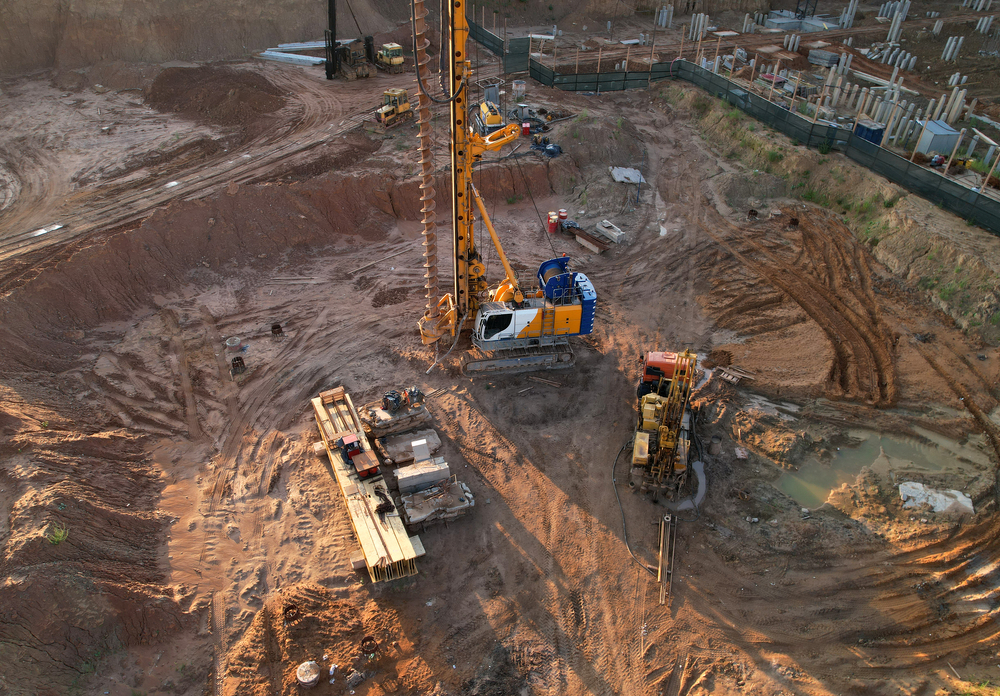Geotheta Things To Know Before You Get This

A geotechnical designer is a specialized civil designer who concentrates on the behavior of dirt, rock, and other products located under the Earth's surface. They apply clinical concepts and engineering techniques to assess the buildings and actions of these products to support the risk-free and reliable style, building, and upkeep of infrastructure projects.
They perform site examinations, gather examples, do lab tests, and assess data to review the suitability of the ground for building tasks - Consulting Engineers. Based upon their searchings for, geotechnical engineers give recommendations for foundation style, slope stability, maintaining frameworks, and reduction of geotechnical threats. They collaborate with various other experts, such as designers, architectural engineers, and building teams, to ensure that geotechnical factors to consider are incorporated right into the total job style and application
By examining the behavior and residential or commercial properties of soil and rock, they can determine possible geotechnical dangers such as landslides, dirt negotiation, or slope instability. Their experience assists avoid failings or crashes that can jeopardize lives and residential or commercial property. Here are some in-depth obligations and obligations of a geotechnical designer: Site Examination: Geotechnical engineers conduct website investigations to gather information on subsurface conditions.
They interpret the data to recognize the residential or commercial properties and behavior of the soil and rock, including their stamina, permeability, compaction features, and groundwater problems. Geotechnical Analysis and Design: Geotechnical designers assess the information collected throughout website investigations to evaluate the stability and viability of the website for building jobs. They perform geotechnical estimations and modeling to review variables such as bearing ability, negotiation, slope security, lateral planet stress, and groundwater flow.
9 Easy Facts About Geotheta Described
Foundation Layout: Geotechnical designers play a critical function in developing foundations that can securely support the intended framework. They evaluate the dirt conditions and tons demands to figure out the appropriate foundation type, such as superficial foundations (e.g., grounds), deep structures (e.g (https://geotheta.start.page)., piles), or specialized techniques like soil enhancement. They take into consideration factors such as negotiation limitations, birthing capability, and soil-structure communication to develop optimum foundation styles
They evaluate construction strategies, screen website tasks, and perform field inspections to confirm that the layout recommendations are complied with. If unforeseen geotechnical concerns develop, they evaluate the circumstance and supply referrals for removal or modifications to the layout. Danger Analysis and Reduction: Geotechnical designers analyze geotechnical dangers and threats connected with the task website, such as landslides, liquefaction, or soil disintegration.

Partnership and Interaction: Geotechnical engineers function closely with other experts associated with a task, such as designers, architectural engineers, and building teams. Efficient communication and collaboration are vital to integrate geotechnical considerations right into the general task style and building procedure. Geotechnical engineers provide technical expertise, response inquiries, and ensure that geotechnical demands are met.
How Geotheta can Save You Time, Stress, and Money.
Below are some kinds of geotechnical designers: Structure Engineer: Foundation engineers specialize in designing and evaluating foundations for frameworks. They analyze the soil problems, tons demands, and site features to determine one of the most appropriate foundation type and layout, such as shallow foundations, deep structures, or specialized methods like pile structures.
They examine the variables affecting slope stability, such as soil residential or commercial properties, groundwater conditions, and slope geometry, and establish methods to stop incline failures and minimize threats. Quake Engineer: Quake designers focus on evaluating and designing structures to hold up against seismic forces. They assess the seismic risk of a site, examine dirt liquefaction potential, and create seismic style standards to ensure the safety and security and strength of structures during earthquakes.
They perform area testing, gather examples, and assess the accumulated data to identify the dirt buildings, geologic developments, and groundwater problems at a website. Geotechnical Instrumentation Designer: Geotechnical instrumentation designers concentrate on surveillance and determining the habits of soil, rock, and structures. They mount and maintain instrumentation systems that keep an eye on factors such as soil negotiation, groundwater levels, slope movements, and structural variations to analyze performance and supply very early warnings of prospective issues.
The smart Trick of Geotheta That Nobody is Talking About
They have a tendency to be investigative people, which implies they're intellectual, introspective, and investigative. They wonder, systematic, reasonable, analytical, and sensible. Several of them are also social, indicating they're kind, charitable, participating, person, caring, helpful, empathetic, sensible, and pleasant. Does this sound like you? Take our totally free career test to learn if geotechnical designer is one of your leading profession matches.
In the workplace atmosphere, geotechnical engineers make use of specialized software tools to do computations, create designs, and evaluate data. They prepare records, testimonial job specifications, communicate with customers and team members, and coordinate task tasks. The office setup supplies a helpful setting for research study, evaluation, and cooperation with various other specialists included in the task.
Geotheta Can Be Fun For Everyone
They frequently check out task sites to perform site examinations, analyze geotechnical conditions, and collect information for evaluation. These check outs entail taking a trip to different areas, sometimes in remote or tough terrains. Geotechnical engineers might perform dirt sampling, conduct examinations, and monitor construction activities to make sure that the geotechnical aspects of the job are being implemented appropriately.
Geotechnical engineers additionally function in specialized geotechnical labs. In these facilities, they perform experiments, execute examinations on soil and rock examples, and evaluate the engineering properties of the products. Geotechnical lab designers work thoroughly in these settings, handling testing tools, running instruments, and tape-recording information. They work together with various other laboratory personnel to make sure accurate and reliable testing results.
Comments on “Geotheta Fundamentals Explained”